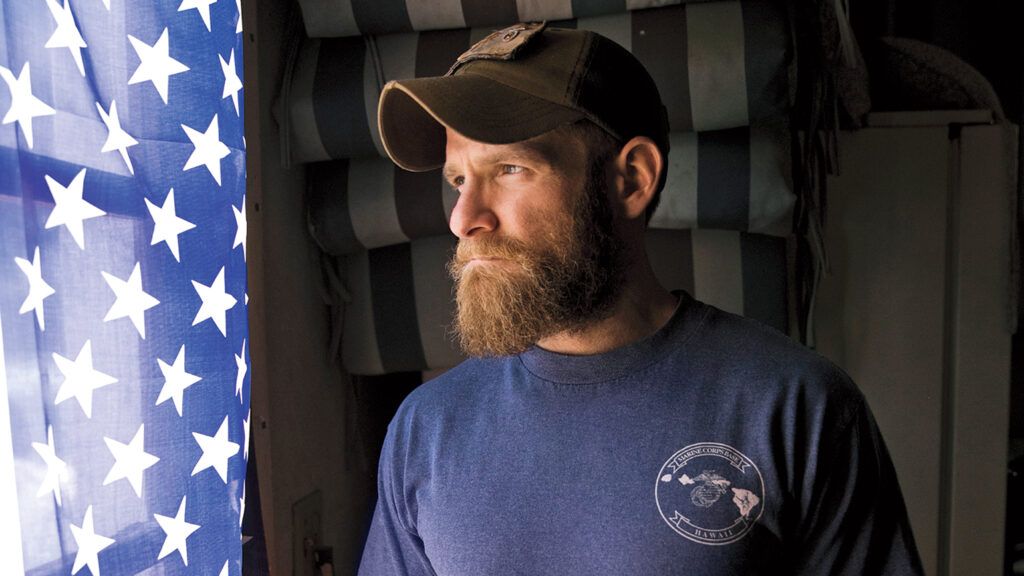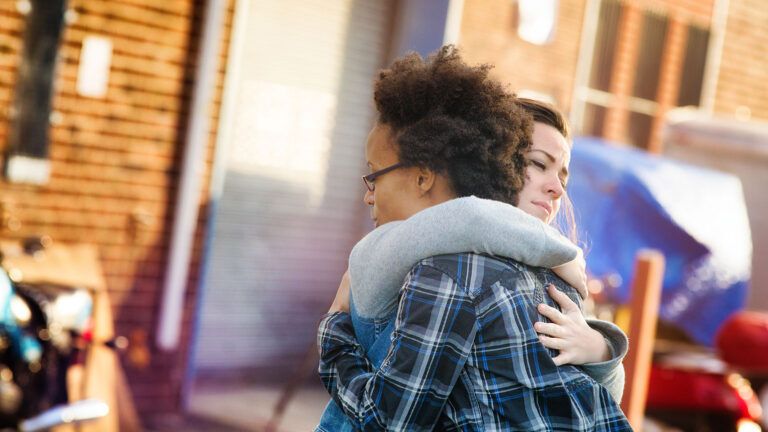You probably saw pictures of me all over social media this past April. I’m the dude who literally crawled across the finish line of the Boston Marathon. I was totally gassed. But nothing on earth was going to keep me from finishing, because it wasn’t just me. My left running shoe had the names of three comrades in Afghanistan whose lives had been destroyed by an IED.
“Adapt and overcome” was pounded into us in the Marines. I had to push through. I got down on my hands and knees and crawled to the finish line. For Ballard. For Hamer. For Juarez.

2019 issue of Guideposts
Running had never been a thing with me. I had to do it in basic, and I took it up again only at a low point, after returning to civilian life. Fighting overseas, I had been in charge of multimillion-dollar equipment and entrusted with the lives of fellow Marines. But back home in Ohio, I couldn’t get anyone to hire me. Finally I applied for work as an electrician and learned the trade. But my self-esteem was shot. Nothing was the same. My marriage fell apart, and my wife and I divorced. I was tortured by survivor’s guilt. Those guys who had died over there—couldn’t I have saved them somehow?
Did You Know Guideposts Helps Veterans and Active Duty Military? Learn More
I had enlisted in 2007, after one semester at Hiram College and one at Kent State. School wasn’t really doing it for me, and the idea of signing up for the military was appealing to me, sacrificing oneself for something bigger. I’d played football and basketball in high school and was in good shape. I figured boot camp at Parris Island would be a breeze. But I soon discovered that the real discipline for a Marine was mental. Learning how to tough things out. To be tougher than the enemy.
That mind-set came in handy when I was deployed. I was a machine gunner with the First Battalion, Third Marines—the Lava Dogs. I did two deployments, first in Iraq, then in Afghanistan. We did about 400 missions altogether. My mom wasn’t crazy about me signing up for the military and had given me a silver charm to keep in my flak jacket, a little angel with wings. I hung it on a piece of cord when I sat up there in the gun turret. January 9, 2010. Afghanistan, deep in Taliban territory. I was worried about fellow Marines Mark Juarez and Matthew Ballard and the British journalist who was embedded with us, Rupert Hamer.
Get a Free Booklet Created Especially for Service Members and Veterans
I was the lead machine gunner and the first squad leader, in charge of six other gunners. Our staff sergeant knew I had a lot of experience and had asked me where we should put everybody in the convoy. I placed myself in the first vehicle, which was usually the most dangerous position, the one most likely to hit an IED. Ballard and I had become good friends. He was expecting a son back in the States—I didn’t want him to be at as much risk. I didn’t know Juarez and Hamer as well, but I knew they had families back home. I put the three of them in the last vehicle, where I figured they’d be safer.
IED stands for “Improvised Explosive Device,” also called Improvised Expletive Device. You’re constantly on the lookout for them. I mean all the time. And it’s still not good enough. Our convoy was hauling supplies, journalists and fellow Marines between bases. It was early in the day when we hit that deadly 400-pound IED. It didn’t explode under the first truck—the one I was in. Instead it exploded under the last vehicle. Hamer and Juarez were killed instantly. Ballard was thrown from the turret and landed on the ground, both legs shattered. There was screaming and blood and debris everywhere.
Instantly we reverted to our training. We created a 360-degree safe zone around the convoy so Ballard could be medevaced out and the bodies of Hamer and Juarez could be airlifted out. We who remained stayed focused. Once the casualties were taken care of, we had to move on. We had to complete our mission. All the while I asked myself, Why hadn’t I seen that bomb? Could we have avoided it?
Later on during that deployment in Afghanistan, I hit two more IEDs and survived both. The first one didn’t go off. It had been wired wrong. We were lucky, really lucky. Yet deep down a part of me wondered if I didn’t deserve to be blown up too.
The second one was a powerful 50-pound bomb. The blast knocked me out, my ears ringing, but I wasn’t bleeding anywhere. I still had my arms and legs. We had music playing in the truck that day, and somehow the iPod survived the blast. The song I heard while the doctor was checking my vitals was Sarah McLachlan’s “Angel.”
The Marines wanted to medevac me out, but I knew if that happened I wouldn’t be able to return to my buddies in the platoon. I would have been sent back to my duty station. Instead I stayed at the base and didn’t go on any missions for a week, trying to clear my head. We got mortared on the base that same week. More explosions, more screams, more destruction.
I was honorably discharged after four years. I had served my time and served my country. It was when I was back home in Ohio that the survivor’s guilt hit me big-time. Here I was, safe, close to family and friends. But I didn’t feel safe, wracked by memories, horrible nightmares waking me up at night. I loved my wife, Sarah. I didn’t know why we couldn’t keep our marriage together. I was a mess inside, as if a bomb had gone off inside my soul.

It was then, living by myself, that I took up running. I’d heard that you could get this runner’s high when you increased the mileage, and I needed something to take me out of myself, something to release me from my feelings. I’d put those men in the last vehicle. I’d chosen the spot where two of them would die instantly. For months I’d held out hope for Ballard. He made it to Walter Reed and endured multiple surgeries to repair his shattered legs. He came home to be with his wife and son. But things went bad for him. The pain was so intense; the painkillers were too many to count. He died of a heart attack.
I ran outdoors under groves of trees along Ohio’s Freedom Trail. I thought of Ballard, Hamer, Juarez. Three names. I knew those guys were in heaven—they’d done their best. I wanted to do my best for them here on earth. I started this habit of praying their names as I ran. Every day running a little further, a little faster, staying close to them. Inhale—“Ballard”—exhale. Inhale—“Hamer”—exhale. Inhale—“Juarez”—exhale. Someone suggested I run a half-marathon. I did it in Canton. Then a marathon. I did that in Canton too, fueled more by guilt than anything else. My work was going well. I ended up being hired as a substation electrician for FirstEnergy Ohio Edison. If only this sense of responsibility for my comrades’ deaths would leave me. It was the thing I could not outrun.
Sarah and I started talking again, slowly rebuilding the trust between us. In 2017, we remarried. She could see the change in me since I’d taken up running, the healing that was going on. That I was trying. The guilt was never completely gone, but I had a way to fight it. And I felt as if I was doing something to honor my fallen comrades.
It was Sarah’s idea, putting their names on my shoes. By the time I was running the Boston Marathon, we had the good news that we were expecting our first child.

line after his legs locked up at Mile 22
Meet Marine Veteran Kirstie Ennis, Wounded Warrior and Mountain Climber
I wouldn’t have scripted it the way it turned out, crawling to the finish line. What an inglorious end for a Marine. Some people saw that shot of me on my hands and knees and thought maybe I’d just knelt down to thank God. Well, I wouldn’t have crawled to do that. But I did say a prayer for 26 miles with every inhale and exhale. Ballard. Hamer. Juarez. Those guys felt very near. I’ll run in their memory forever.
When that bomb went off, I too was injured, a moral injury that tore into my soul, throwing off all sorts of spiritual shrapnel. I feel as if I am trying to put my soul together with every mile I run, outpacing the guilt that exploded that day on the battlefield. Every mile I run draws me closer to God.
For more inspiring stories, subscribe to Guideposts magazine.





